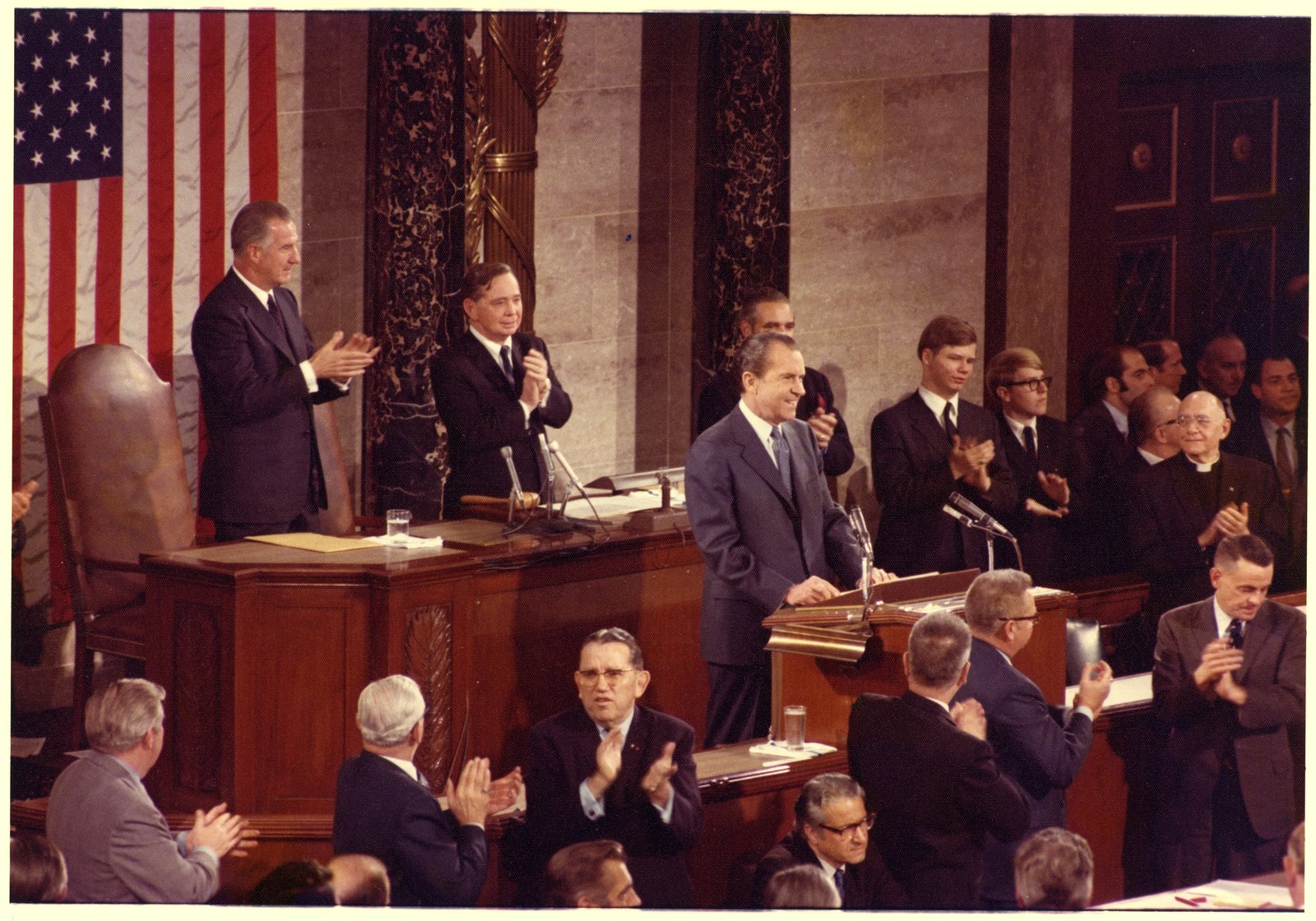The election year of 1968 was a tumultuous one marked by the assassinations of Sen. Robert Kennedy and civil rights leader Martin Luther King, urban race riots, college antiwar demonstrations, and a Democratic National Convention that saw the Chicago police and the National Guard have violent clashes with protestors.
The 1968 Election
Republican presidential candidate Richard Nixon (1913–1994) campaigned on a platform of “law and order” in the 1968 election. In his acceptance speech for the Republican nomination at the Republican National Convention in Miami Beach, he said:
The first civil right of every American is to be free from domestic violence, and that right must be guaranteed in this country.
Time is running out for the merchants of crime and corruption in American society. The wave of crime is not going to be the wave of the future in the United States of America. We shall reestablish freedom in America so that America can take the lead in reestablishing freedom from fear and the world. And to those who say that law and order is a code word for racism, here is the reply. Our goal is justice. Justice for every American. If we are to have respect for law in America, we must have laws that deserve respect.
Nixon went on to win 32 states and 301 electoral votes that year, and then in the 1972 election, he won 49 states and 520 electoral votes before resigning in disgrace on August 9, 1974, because of the Watergate scandal.
Unfortunately, Nixon’s emphasis on “law and order” led to his declaration of the war on drugs on June 17, 1971. Speaking at a press conference at the White House, Nixon said:
America’s public enemy number one in the United States is drug abuse. In order to fight and defeat this enemy, it is necessary to wage a new, all-out offensive.
This will be a worldwide offensive dealing with the problems of sources of supply, as well as Americans who may be stationed abroad, wherever they are in the world. It will be government wide, pulling together the nine different fragmented areas within the government in which this problem is now being handled, and it will be nationwide in terms of a new educational program that we trust will result from the discussions that we have had.
Nixon then appointed the first drug czar and in 1973 signed legislation to create the Drug Enforcement Administration (DEA). The Constitution, limited government, federalism, personal freedom, property rights, and financial privacy have suffered ever since.
The 2022 Election
There is no question that crime in America is on the increase, especially since the beginning of “the pandemic.” Conservatives generally blame this on Democratic “soft on crime” policies like not prosecuting certain categories of misdemeanors, early release of violent offenders, low or no bail, and defunding the police. About six months before the election, the House Republican Study Committee (RSC) catalogued every GOP argument about crime in the previous two years and distilled it into a single memorandum. The memo states in part:
From the White House to liberal state and local governments, there has been a systemic failure to contain crime in America. It stems from the dangerous belief that enforcing the law is somehow morally wrong or even racist. It has paralyzed law enforcement agencies at all levels and created prosecutors who would rather let a dangerous criminal walk out of jail than enforce the law.
Crime is at an unacceptable level and Americans are desperate for solutions. They need to know that Conservatives have a plan to make them safe.
Republicans last year issued their Commitment to America that outlined what they intended to do if they regained control of the Congress. One of its planks is entitled “A Nation that’s Safe.”
“Democrats are the party of crime,” said the Republicans. “As a direct result of their ‘defund the police’ and soft-on-crime policies, cities across America have suffered a stark increase in crime.” Republicans maintained that they had “a plan to uphold law and order across America.”
The Heritage Foundation, a conservative think tank, released a report just before the election titled “The Blue City Murder Problem” that “highlighted that 27 of the top 30 cities with the highest murder rates as of June 2022 were run by Democratic mayors.” In another election-related article, the National Rifle Association (NRA), after recounting the rising crime rates in Democratic-controlled large cities and how gun-control advocates “continue to blame law-abiding American gun owners for the rise in violent crime,” insisted that “if we want to put an end to this madness, this midterm election must be about supporting the Second Amendment and law and order.”
But once again, when conservatives talk about the increase in the crime rate and the need for “law and order,” the Constitution, limited government, federalism, personal freedom, property rights, and financial privacy go by the wayside. Conservative Republicans are now openly calling for the government to execute drug dealers. About six weeks before the 2022 midterm election, Florida senator Marco Rubio, along with 12 other Republican senators, introduced the “Felony Murder for Deadly Fentanyl Distribution Act” (S.4876). It is a short bill that simply amends federal law to make fentanyl distribution resulting in death punishable as felony murder, for which the sentence is life in prison or the death penalty.
Former President Trump—still the darling of many conservatives—is one of the most vocal cheerleaders for the execution of drug dealers. Early in 2022, he declared that the penalties for drug dealers “should be very, very severe.” How severe? According to Trump: “If you look at countries throughout the world, the ones that don’t have a drug problem are ones that institute a very quick trial death penalty sentence for drug dealers.” He even dubiously maintained: “You execute a drug dealer, and you’ll save 500 lives.” At a rally in Ohio on the day before the midterm election, he reiterated that drug dealers during the course of their lives “will kill an average of 500 Americans.” And then Trump bluntly said: “I am calling for the death penalty for drug dealers and human traffickers, which will, upon its passage, reduce drug distribution and reduce crime in our country by a minimum of 75 percent.”
Libertarianism
Can libertarians be for “law and order?” Should libertarians be for “law and order?” Is it libertarian to say: “Do the crime, do the time?” Should the government be able to lock people up for years for breaking its laws? Is the government ever justified in keeping law violators in prison for life without the possibility of parole? Is it ever acceptable for the government to execute someone for violating a law? Is there such a thing as an unjust law? Is it ever okay to break the law? Can a libertarian be “soft on crime?” Is being for “law and order” racist? Can a libertarian be a law enforcement officer? Is it virtuous to be a law-abiding citizen? Is it a sin or immoral to violate a government law? Should nonviolent criminals ever be incarcerated? Is there any shame in being “a lawbreaker?”
The libertarian answer is: It depends on the law. To see why this is so, let us first briefly revisit what libertarianism is and what it isn’t. Libertarianism is the philosophy that says that people should be free from individual, societal, or government interference to live their lives any way they desire, pursue their own happiness, engage in voluntary associations, accumulate wealth, assess their own risks, make their own choices, participate in any economic activity for their profit, engage in commerce with anyone who is willing to reciprocate, and spend the fruits of their labor as they see fit. Nonaggression is the libertarian creed. Aggression is theft, fraud, and the initiation or threat of nonconsensual violence. Violence is justified only in defense of one’s person or property or in retaliation in response to aggression against them. No violence may be used against a nonaggressor. Force is justified only in defense or retaliation. Force must be proportional but is neither essential nor required. As long as people don’t violate the personal or property rights of others, and as long as their actions are peaceful, their associations are voluntary, and their interactions are consensual, they should be free to live their lives without license, regulation, interference, or molestation by the government.
Here is the short version: Libertarianism holds that people should be free to live their lives any way they choose as long as their conduct is peaceful, their interactions are consensual, and their actions don’t violate the personal or property rights of others.
One’s lifestyle, tastes, preferences, vices, sexual practices, traditions, habits, employment, religion, aesthetics, sensibilities, outlook, cultural norms, or view of pornography, social media, or technology have nothing to do with it.
But contrary to liberals and conservatives who may give lip service to some of the tenets of libertarianism, “libertarians,” in the words of the great libertarian theorist Murray Rothbard (1926–1995), “apply a universal human ethic to government in the same way as almost everyone would apply such an ethic to every other person or institution in society” and “apply it fearlessly.” Libertarians “make no exceptions to the golden rule and provide no moral loophole, no double standard, for government.” This is because, as former Foundation for Economic Education president Richard Ebeling has well said, “There has been no greater threat to life, liberty, and property throughout the ages than government. Even the most violent and brutal private individuals have been able to inflict only a mere fraction of the harm and destruction that have been caused by the use of power by political authorities.”
Government
In a libertarian society, that is, a free society, government—in whatever form it would take—would be limited to the protection of natural rights, not the bestowing of rights. All government actions—at any level of government—beyond actual defensive actions, open judicial proceedings, and reasonable policing activities would be illegitimate. Government would be prohibited from interfering with peaceful, voluntary, and consensual activity that does not aggress against the person or property of others. As long as people didn’t infringe on the liberty of others by committing, or threatening to commit, acts of fraud, theft, aggression, or violence against their person or property, the government would just leave them alone.
The best explanation of the proper role of government is not anything written by a modern libertarian. It is found in a pamphlet written in 1850 by the French economist Frédéric Bastiat (1801–1850) called simply The Law:
Can the law—which necessarily requires the use of force—rationally be used for anything except protecting the rights of everyone? I defy anyone to extend it beyond this purpose without perverting it and, consequently, turning might against right.
It is not true that the function of law is to regulate our consciences, our ideas, our wills, our education, our opinions, our work, our trade, our talents, or our pleasures. The function of law is to protect the free exercise of these rights, and to prevent any person from interfering with the free exercise of these same rights by any other person.
Every individual has the right to use force for lawful self-defense. It is for this reason that the collective force—which is only the organized combination of the individual forces—may lawfully be used for the same purpose; and it cannot be used legitimately for any other purpose.
Thus, since an individual cannot lawfully use force against the person, liberty, or property of another individual, then the common force—for the same reason—cannot lawfully be used to destroy the person, liberty, or property of individuals or groups.
Since no individual acting separately can lawfully use force to destroy the rights of others, does it not logically follow that the same principle also applies to the common force that is nothing more than the organized combination of the individual forces?
If this is true, then nothing can be more evident than this: The law is the organization of the natural right of lawful defense. It is the substitution of a common force for individual forces. And this common force is to do only what the individual forces have a natural and lawful right to do: to protect persons, liberties, and properties; to maintain the right of each, and to cause justice to reign over us all.
If a nation were founded on this basis, it seems to me that order would prevail among the people, in thought as well as in deed. It seems to me that such a nation would have the most simple, easy to accept, economical, limited, nonoppressive, just, and enduring government imaginable—whatever its political form might be.
Under such an administration, everyone would understand that he possessed all the privileges as well as all the responsibilities of his existence. No one would have any argument with government, provided that his person was respected, his labor was free, and the fruits of his labor were protected against all unjust attack.
Now, that is “law and order” that any freedom-loving American should wholeheartedly support.
Crime
Because of their view of what the law should and should not do, libertarians believe that every crime needs a tangible and identifiable victim who has suffered measurable harm to his person or measurable damages to his property. Libertarians hold that potential, probable, or possible victims are not real victims, and that crimes against religion, decency, custom, tradition, humanity, nature, society, the greater good, the public interest, or the state are not real crimes at all. Committing mortal sin, having bad habits, exercising poor judgment, engaging in risky behavior, practicing self harm, participating in dangerous activities, adopting unhealthy living, pursuing addictive conduct, undertaking immoral actions, and committing vices are not necessarily crimes. It is on this latter point that nineteenth-century classical-liberal political philosopher Lysander Spooner (1808–1887) so eloquently expounded:
Vices are those acts by which a man harms himself or his property. Crimes are those acts by which one man harms the person or property of another. Vices are simply the errors which a man makes in his search after his own happiness. Unlike crimes, they imply no malice toward others, and no interference with their persons or property.
Unless this clear distinction between vices and crimes be made and recognized by the laws, there can be on earth no such thing as individual right, liberty, or property—no such things as the right of one man to the control of his own person and property, and the corresponding and coequal rights of another man to the control of his own person and property.
It should be evident that no one should ever be arrested or fined for committing a victimless crime. Similarly, only criminals who initiate violence or aggression against someone should ever be incarcerated.
Since the subject of drugs and drug dealers has already been mentioned in connection with “law and order,” we can use drug laws as examples of unjust laws that should have never been passed and should never be enforced. Because using, buying, selling, processing, manufacturing, or possessing drugs—any drug, from marijuana to fentanyl—on one’s own property (or another’s property with permission) in a peaceful manner does not violate the personal or property rights of others, there should be no laws at any level of government for any reason regarding the doing of these things. Therefore, all drug laws should be repealed, all government agencies devoted to fighting the war on drugs should be abolished, all prisoners incarcerated solely for violating drug laws should be released, and the war on drugs should be ended completely and immediately. There should be a free market in drugs witout any government regulation, rules, or restrictions. Although these things should apply to government at any level, drug laws at the federal level are particularly evil since the Constitution nowhere authorizes the federal government to have anything to do with criminalizing, prohibiting, or regulating any drug in any manner. None of this means that using drugs is not risky, dangerous, unhealthy, immoral, or addictive. And none of this means that people aren’t responsible for any negative consequences or externalities resulting from their drug use.
“Law and order” is a desirable thing, but only when the laws are just, and private, peaceful activities are not criminalized.
This article was originally featured at the Future of Freedom Foundation and is republished with permission.































